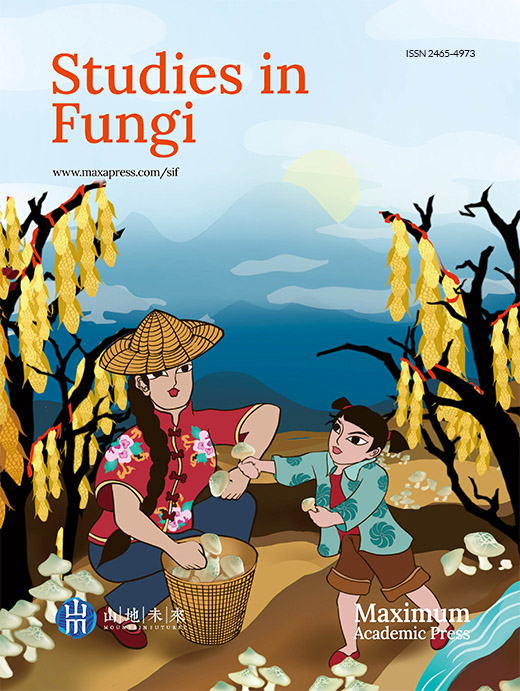Optimal culture conditions and toxicity assessment of Fomitopsis feei (Fr.): a newly documented macro fungus from Philippines
-
1.
Department of Biological Sciences, College of Science, Central Luzon State University, Science City of Muñ
-
2.
Center for Tropical Mushroom Research and Development, Central Luzon State University, Science City of Muñoz, Nueva Ecija, Philippines
More Information
-
Corresponding author:
AM De Leon, angelesdeleon@clsu.edu.ph
-
Received:
23 April 2020
Revised:
09 November 2020
Published online:
26 November 2020
Studies in Fungi
5(1): 491−507(2020) |
Cite this article
-
Abstract
Mushrooms are known to be utilized by ethnic communities and Paracelis, Mountain Province is one of the places in Philippines inhabited by several of these native groups. Many studies have been conducted on various macrofungi, however no studies have been reported about Fomitopsis feei in the Philippines particularly in Paracelis, Mountain Province. It is a brown-rot bracket fungus, belonging to the family Fomitopsidaceae, characterized by a sessile effuse-reflexed basidiomata, with its color ranging from white to pinkish or brown. This mushroom has been reported to have antimicrobial properties, hence optimization of its culture condition could lead to its mass production for its biopharmaceutical potential. In order to develop a mass cultivation protocol of this mushroom, this study was conducted to determine the optimum conditions for its mycelial growth. The effect of different culture media using local substrates and evaluating environmental factors such as pH, aeration, illumination, and temperature were assessed. Optimum conditions for the secondary mycelial growth of F. feei produced very thick and largest radial growth on coconut water gelatin (CWG) medium (83.57 mm) at pH 6.5 (83.13 mm), in sealed (85 mm), dark conditions (85.00 mm) at room temperature (28-32℃) (81.96 mm). The most abundant mycelial growth was found in cracked corn as grain spawning material. This study also determined the teratogenic and cytotoxic activity of the ethanol extract of F. feei against the zebra fish (Danio rerio) embryos and brine shrimp (Artemia salina) nauplii. Fomitopsis feei exhibited teratogenic effects against the developing D. rerio embryos wherein growth retardation, malformation of tail, yolk deformity, pericardial edema, curved body, scoliosis and little pigmentation were the notable teratogenic effects of the ethanol extract to the developing embryos. Embryos treated with ≥1000 ppm recorded high mortality rate. Hatchability was most evident at lower concentrations ≤750 ppm. In terms of heartbeat, as the concentration of the extract increased, the heartbeat rate significantly decreased. For the cytotoxicity, 1250 ppm has the highest mortality rate with 73.33%. Using probit analysis, the LC50 is 534.676 ppm which is considered as mildly toxic. Thus, F. feei in higher concentrations exhibit toxic effect. These results indicate that F. feei has a pharmaceutical potential and could be harnessed for its bioactivities.
-

-
Rights and permissions
Copyright: © 2020 by the author(s). This article is an open access article distributed under Creative Commons Attribution License (CC BY 4.0), visit https://creativecommons.org/licenses/by/4.0/.
-
About this article
Cite this article
AM De Leon, AR Dulay, AL Villanueva, SP Kalaw. 2020. Optimal culture conditions and toxicity assessment of Fomitopsis feei (Fr.): a newly documented macro fungus from Philippines. Studies in Fungi 5(1):491−507 doi: 10.5943/sif/5/1/30
|
AM De Leon, AR Dulay, AL Villanueva, SP Kalaw. 2020. Optimal culture conditions and toxicity assessment of Fomitopsis feei (Fr.): a newly documented macro fungus from Philippines. Studies in Fungi 5(1):491−507 doi: 10.5943/sif/5/1/30
|












